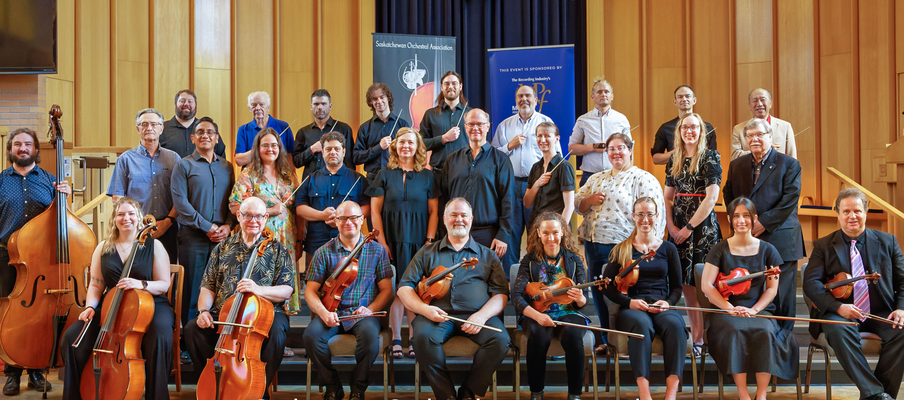
Life-long learning opportunities enrich the musical landscape in Saskatchewan
In this issue
 Engage - Volume 15, Issue 1, Fall 2024
Engage - Volume 15, Issue 1, Fall 2024
Cultural Areas
ArtsFrom their Beginner Player Program to the world’s only Saito-based conducting workshop, the Saskatchewan Orchestral Association (SOA) supports ongoing learning opportunities for string players and conductors in the province. Opportunities for these musicians to enhance their craft are key to the continued growth and enjoyment of orchestral music as part of the province’s vibrant cultural community.
Elaine Kaloustian, executive director, SOA, says the organization is the only support for orchestral development in Saskatchewan, as string playing is not subsidized or supported in school band programs in the same way as other instruments. “Our organization provides a healthy opportunity for people of all ages to participate in the performance of orchestral music,” she says, “and, for audiences across the province to enjoy the artistic, intellectual, and emotional stimulation that performances provide both at amateur and professional levels.”
Celebrating their 40th anniversary next year, the SOA continues to adapt and respond to the needs of the community they serve. It offers grassroots initiatives for youth and amateur musicians, provides wages to professional musicians as instructors and supports new orchestral groups, such as the Latinas en Regina, a new Mariachi ensemble.
Adrian Casas, president, SOA, says because of the organization’s support for development of skills, it builds the orchestral community and creates new opportunities for musicians and conductors in the province. For Casas, when he took the Saito-based conducting workshop, his technique in conducting not only improved, but he also gained connections with musicians around the world. In addition, new opportunities came his way when the Regina Community and the University of Regina orchestras invited him to conduct.
Overall, the study of music and conducting develops other essential skills that grow community, says Casas. “If you’re in an ensemble, you have to make sure you’re leading as much as following. That develops leadership skills. And when you’re a part of an orchestra you have to pull your own weight or the entire group falls apart. So you learn collaboration.” In addition, Kaloustian says, “Music plays a significant role in life-long learning by engaging multiple aspects of our cognitive and emotional development. People have written PhD dissertations, and a plethora of studies have been done, about how the study of music develops cognitive skills, emotional intelligence, cultural understanding, creativity and innovation, social connections and lifelong engagement in music.”
Overall, the larger community benefits by the SOA’s existence. She says, “We regard music in general, and orchestral music specifically, as an essential human element, as music is an important way through which people can be educated.” In addition to educating and training performers to play their instruments in a way that enhances emotional responses, she says, “the broad community finds value in feeling excited, calmed and every other emotion through experiencing music.”
She notes that the SOA’s summer workshops and youth orchestras in Regina and Saskatoon have significantly contributed to building a solid foundation of skilled performers. These programs have helped cultivate talent that now supports professional organizations, such as the symphony orchestras in Saskatoon and Regina, who benefit from the contributions of local musicians.
The Saskatchewan Orchestral Association receives Annual Global Funding from the Sask Lotteries Trust Fund for Sport, Culture and Recreation.

